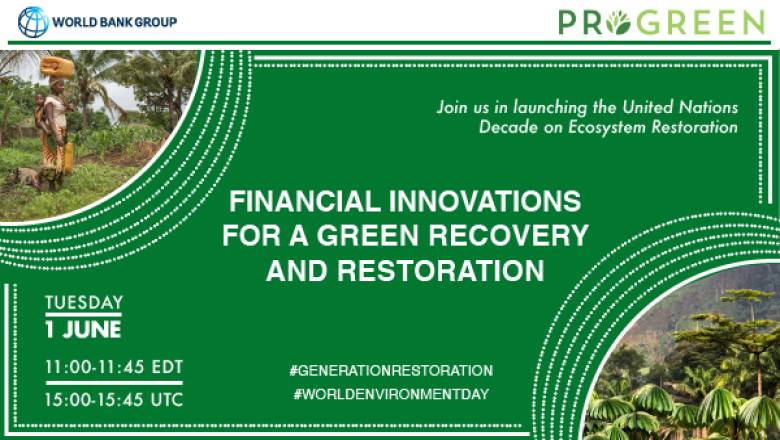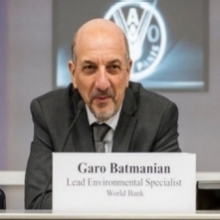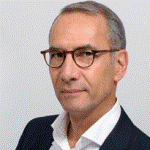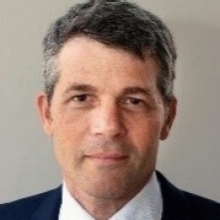Financial Innovations for a Green Recovery and Restoration
June 1, 2021
Online | 11:00-11:45 EDT (15:00-15:45 UTC)
MULTIMEDIA

-
Investing in nature is an investment in the future. However, many countries are currently facing mounting debt crises and shrinking resources resulting from the COVID-19 economic downturn and spending on recovery efforts. We need both scaled up investment and financial innovations to bridge the public financing gap for investment in nature-based solutions (NBS) to address the climate and biodiversity crises and deliver on the Sustainable Development Goals.
Fiscal instruments can help close this financing gap by making better use of resources by creating incentives that direct development and COVID recovery onto a more sustainable path without diverting large amounts of public funds or increasing public debt. Through subsidy reform and innovative tax incentives, governments can create incentives that prioritize green growth, sustainable global value chains, improved management of forests, and restoration of degraded land- and sea-scapes. Policy makers can use fiscal reform to create better incentives for the private sector to co-invest in forest conservation and restoration. By improving fiscal incentives, first the economy-wide cost of sustainability transitions falls and second the private sector shoulders a greater share of financing needs for those transitions. Both effects are key to reducing the public financing gap for restoration and other sustainable development goals.
This session brought together investment banks, government officials, private sector companies engaged in activities that impact land use and policy experts to discuss innovations in financing and fiscal incentives that have the potential to transform landscapes through restoration, improved land use practices and sustainable commodity supply chains.
-

Musonda Mumba (Moderator)
Director for The Rome Centre for Sustainable Development under the United Nations Development Programme (UNDP)
Musonda Mumba is the Director for The Rome Centre for Sustainable Development under the United Nations Development Programme (UNDP), in close collaboration with the Italian Government's Ministry of Environment and Ecological Transition. The Centre focuses on three priority areas: climate change, sustainable development, and nature protection. In her role, Mumba provides strategic leadership on these matters through convening, collaboration, connecting, and co-creation as the world navigates complexity and uncertainty, with the aim of achieving the UN's Sustainable Development Goals collectively. She is also the Chair of the Global Partnership on Forest and Landscape Restoration (GPFLR). She has over 25 years' experience in environmental and conservation issues globally, and has published widely in various journals, newspapers, articles, and contributed to book chapters. Before joining UNDP, Mumba was the head of United Nations Environment Programme – UNEP’s Terrestrial Ecosystems Programme, and served in various roles over a period of 12 years. A Zambian national, she received her BSc. Ed. at University of Zambia and her Ph.D. at University College London in wetland conservation and hydrology.

Garo Batmanian
Global Lead for Forests, Landscapes, and Biodiversity, World Bank
In this capacity, Garo oversees global initiatives and partnerships related to terrestrial ecosystems including the PROGREEN Partnership for Sustainable and Resilient Landscapes, and the World Bank Forest Investment Program (FIP) portfolio, and the Global Wildlife Program (GWP). Previously Garo held the position of the World Bank’s Lead Environment Specialist for China and Mongolia, leading initiatives on air pollution, forests, biodiversity conservation, and climate change issues. When he first joined the World Bank in 2004 he worked in the Latin America and Caribbean (LAC) region as a Senior Environmental Specialist in Brazil, leading the preparation and supervision of natural resources conservation and management in the Amazon and Cerrado regions, and national level development policy operations. He also managed the Pilot Program for the Conservation of the Rain Forests-PPG7. Earlier in his career, Garo was the LAC Program Director of WWF-USA, and the first CEO of the World-Wide Fund for Nature (WWF) Brazil. Garo is also the founder of Forest Stewardship Council (FSC) in Brazil and led the process of developing national standards for natural forest management in the Amazon and for plantations. Garo holds a Ph.D. in Ecology from the University of Georgia, USA.
Hans Loth
Global Head UN Environment Partnership, Rabobank
Hans Loth is Global Head UN Environment Partnership at Rabobank. He is responsible for building and managing the bank’s new strategic partnership, which is a keystone in the bank’s global environmental work. Prior to taking up his current position, Hans fulfilled various general management and strategy roles within the Rabobank Group. Most recently, he was Director Strategy & Business Change for Rabobank Indonesia, where he was responsible for developing and implementing a new strategy for the bank in this key Asian market. Prior to that Hans worked with Rabobank Foundation, as well as Rabobank’s corporate banking team, through which he developed a deep understanding of the
challenges and opportunities of global food value chains – “from Farm to Fork”. Hans started his career an international mergers and acquisitions lawyer at a private law firm.

Tangu Tumeo
Senior Programme Officer for IUCN supporting Malawi’s Ministry of Forestry and Natural Resources
Tangu has 13 years’ experience working with government in the Department of Forestry coordinating projects on sustainable forest management and nexus between energy and environment. In her role as Malawi’s Forest Landscape Restoration (FLR) Focal Point, she facilitated the national Forest Landscape Restoration opportunities assessment and implementation strategy development in 2017. Together with technical partners, she facilitated the development of a Forest Landscape Restoration monitoring framework in 2018. In her current role she works with other government agencies on landscape restoration and the National Charcoal Strategy. Since 2016, she has been representing Malawi at international conferences where she has shared the progress Malawi is making towards achieving the 4.5 million hectares for restoration and land degradation neutrality. She has also managed to lobby for funding to initiate implementation of the National Forest Landscape Restoration Strategy both locally and internationally.
Eric Usher
Head UN Environment Programme Finance Initiative
Eric leads the UNEP FI global partnership bringing together the UN with a global group of banks, insurers and investors working to develop the sustainable finance and responsible investment agendas. UNEP FI has established important sustainability frameworks within the finance industry, including the Principles for Responsible Investment (2006), the Principles for Sustainable Insurance (2012) and the Principles for Responsible Banking (2019). Since joining in 2015, Mr. Usher has focused on accelerating the deep integration of sustainability risks into financial practice, including addressing climate change, natural capital loss and human rights abuses, as well as building out the frameworks for positive impact finance needed to achieve the UN Sustainable Development Goals. Eric sits on several industry bodies including as UN representative on the Board of the Principles for Responsible Investment, and as a member of the governing boards of the Sustainable Stock Exchanges Initiative, the Net-Zero Asset Owner Alliance, the Investor Agenda and the impact fund REPP Africa. Prior to leading UNEP FI, Mr. Usher has over twenty years of experience in the low carbon sectors, spanning technology commercialisation in Canada, solar rural electrification in Morocco and financial sector development across emerging markets. During 2011, Mr. Usher worked on the establishment of the Green Climate Fund and led efforts to create its Private Sector Facility. Eric has been an editor of the Global Trends in Renewable Energy Investment report published annually with Bloomberg and was lead author for finance of the IPCC Special Report on Renewable Energy Sources. Earlier in his career, Eric was General Manager of a solar rural electrification company based in Morocco.
-